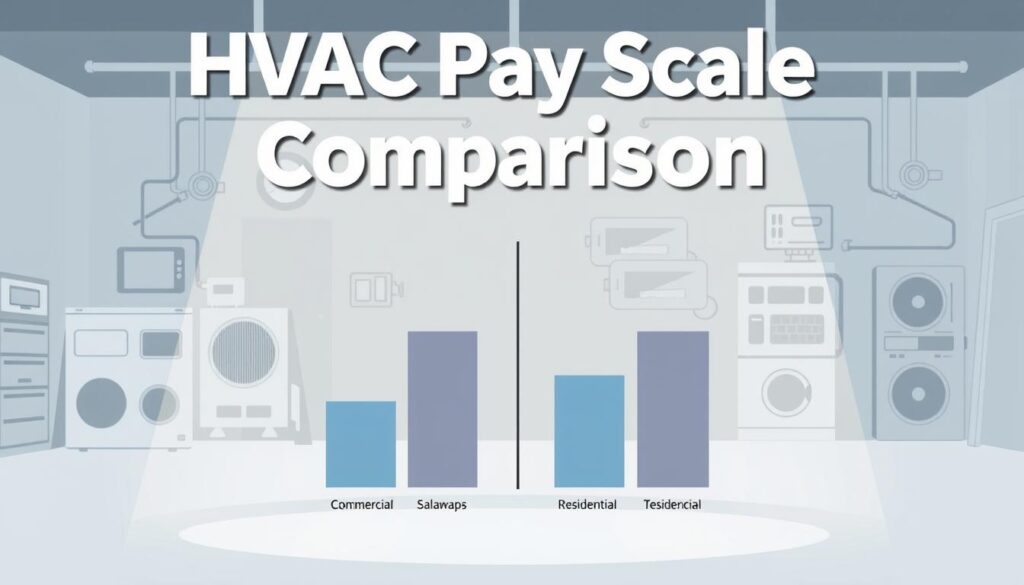Affiliate Disclosure
HVAC Guide Guys is a participant in the Amazon Services LLC Associates Program, an affiliate advertising program designed to provide a means for sites to earn advertising fees by advertising and linking to Amazon.
How Much Money Do You Make in HVAC? Ever wondered how much HVAC workers make? Or if this trade can lead to a well-paying career? HVAC technicians have more earning chances than you might think.

The U.S. Bureau of Labor Statistics says HVAC pros make a median of $50,590 a year. But there’s more to it. Your pay can change based on your experience, where you work, your specialty, and if you have certifications.
This guide will cover everything about HVAC salaries. We’ll look at salaries for beginners and experienced workers. You’ll learn about career growth and how to make more money in this vital field.
Key Takeaways
- HVAC careers offer competitive salaries with significant growth
- Median annual wage for HVAC technicians is $50,590
- Earnings vary based on experience, location, and specialization
- Certifications can dramatically increase your income
- The HVAC industry provides stable career opportunities across the United States
Table of Contents
Understanding HVAC Career Earnings
Exploring HVAC careers shows promising financial growth and earnings. Your salary can change a lot based on different factors. This makes it a dynamic and potentially rewarding career.
Base Salary Ranges for HVAC Professionals
HVAC careers start with good base salaries based on your skills and experience. New technicians usually earn around $31,000 a year. There’s a lot of room for growth.
- Entry-level range: $28,000 – $35,000
- Mid-career range: $45,000 – $65,000
- Experienced professionals: $65,000 – $80,000
Overtime and Bonus Opportunities
Your earnings can go up beyond your base salary. HVAC technicians can make more money through:
- Seasonal overtime during peak heating/cooling seasons
- Emergency repair call-outs
- Performance-based bonuses
“In the HVAC industry, your earning grows with your skills and dedication.” – Professional HVAC Association
Career Growth Trajectory
| Career Stage | Typical Earnings | Growth Opportunities |
|---|---|---|
| Entry-Level | $31,000 | Basic certifications |
| Mid-Career | $55,000 | Specialized skills |
| Senior Level | $75,000+ | Advanced certifications |
By always learning and specializing, you can boost your salary. This opens up exciting career paths.
Explore Our HVAC Shop
Looking for top-rated HVAC tools, parts, and accessories? Visit our shop and find the perfect solution for your needs.
Visit the ShopNational Average HVAC Technician Salaries in 2025
The HVAC field is growing fast in 2025, with great jobs for skilled workers all over the U.S. Knowing the average salaries helps you choose the right career path in this exciting field.
Experts predict a strong job market for HVAC pros, with salaries that show the demand for skilled workers. The HVAC salary landscape looks promising for making good money and having a stable career.
| Experience Level | Annual Salary Range | Hourly Rate |
|---|---|---|
| Entry-Level | $52,000 – $56,200 | $25.50 – $27.00 |
| Mid-Career | $64,000 – $67,400 | $30.75 – $32.50 |
| Experienced | $75,000 – $79,500 | $36.00 – $38.25 |
Here are some key points about HVAC salaries in 2025:
- The median annual base salary for entry-level technicians is about $54,100
- Hourly rates usually fall between $25.50 and $38.25
- Having special skills can really boost your earnings
Your salary in HVAC depends on many things like where you work, your specialty, and extra certifications. By keeping up with trends and improving your skills, you can open up more career doors.
How Much Money Do You Make in HVAC Based on Experience Level
Knowing how much you can earn in HVAC is key for planning your career. The HVAC field offers great salary growth as you gain experience and skills. Your income will rise as you move up in your career.
Entry-Level Positions
At the start, you can make about $54,100 a year. New technicians usually earn between $40,000 and $60,000. This depends on where you work and the job’s needs.
- Starting wages range from $18 to $25 per hour
- Opportunities for rapid skill development
- Potential for overtime and additional training
Mid-Career Earnings
With 3-7 years of experience, your earnings grow. Mid-career HVAC pros make about $65,700 a year. They can also get specialized and advanced certifications.
| Experience Level | Annual Salary | Hourly Rate |
|---|---|---|
| 3-5 Years | $60,000 – $70,000 | $28 – $35 |
| 5-7 Years | $65,000 – $75,000 | $32 – $40 |
Senior Level Income
With 8+ years of experience, you can earn up to $77,200 on average. Senior technicians often work on complex systems or manage teams.
- Advanced certifications boost earning power
- Opportunities in commercial and industrial sectors
- Potential for six-figure incomes with expertise
Explore Our HVAC Shop
Looking for top-rated HVAC tools, parts, and accessories? Visit our shop and find the perfect solution for your needs.
Visit the ShopTop Paying States for HVAC Professionals
Location is key when thinking about an HVAC career. Some states pay much more, which can greatly affect your earnings.
Top-paying states for HVAC pros offer great chances for those willing to move or plan their careers well. Knowing where to work can help you earn more.
| State | Average Annual HVAC Salary | Key Economic Factors |
|---|---|---|
| Alaska | $75,660 | High infrastructure demands, remote locations |
| Massachusetts | $73,300 | Dense urban areas, strict building codes |
| New Jersey | $70,500 | High population density, commercial development |
| California | $68,990 | Tech industry growth, climate diversity |
| Washington | $67,440 | Technology sector, renewable energy focus |
Several factors lead to higher hvac salaries:
- Cost of living in specific regions
- Local economic development
- Regional climate conditions
- Strength of industrial and commercial sectors
Your hvac salary isn’t just about where you work. Skills, certifications, and experience can also increase your earnings, no matter the location.
“Geographic mobility can be a strategic career move for ambitious HVAC professionals seeking higher compensation.” – Industry Expert
Factors Affecting HVAC Technician Compensation
Your earnings as an HVAC technician depend on several key factors. Knowing these can help you plan your career better and increase your pay.
Top HVAC pros know their income isn’t just about skills. It’s also about where they work and how they position themselves in the market. Let’s look at what affects your earnings.
Geographic Location Impact
Your location greatly affects your pay. Salaries vary across different areas due to:
- Local economic conditions
- Cost of living
- Climate challenges
- Population density
Certification Requirements
Having the right certifications can really boost your pay. These show you’re skilled and can lead to higher wages.
| Certification Level | Potential Salary Increase |
|---|---|
| EPA 608 Certification | 5-10% salary bump |
| NATE Advanced Certification | 10-15% salary increase |
| Master Technician Credentials | 15-25% higher compensation |
Industry Demand
Your pay is closely linked to the market. Things like seasonal changes, new tech, and local growth affect your earnings.
“In HVAC, continuous learning and adaptability are your most valuable assets for financial growth.” – HVAC Industry Expert
By positioning yourself well, staying updated, and keeping an eye on market trends, you can change your career and earnings for the better.
Explore Our HVAC Shop
Looking for top-rated HVAC tools, parts, and accessories? Visit our shop and find the perfect solution for your needs.
Visit the ShopCommercial vs Residential HVAC Salary Differences

Looking into the HVAC pay scale shows big differences between commercial and residential jobs. Commercial HVAC techs usually make more because their work is more complex and requires special skills.
The pay gap comes from a few key things:
- Project complexity and scale
- Technical expertise needed
- Challenges of the work environment
- How advanced the equipment and systems are
Commercial HVAC pros deal with big, complex systems in places like offices, hospitals, and factories. They need advanced technical skills and precision. Their pay can be 15-25% higher than those in residential HVAC.
Residential HVAC techs work mostly in homes and smaller buildings. Their work is vital, but the systems are simpler. Your pay in residential HVAC depends on:
- Local demand
- Years of experience
- Extra certifications
- Where you live
Knowing these differences helps you plan your HVAC career better. Getting specialized training and keeping your skills sharp can help close the pay gap between commercial and residential jobs.
Essential Certifications for Higher HVAC Earnings
To boost your HVAC career earnings, getting professional certifications is key. These certifications prove your skills and open up better-paying jobs in the HVAC field.
Getting certified can really help you earn more. By getting the right certifications, you show you have special skills. Employers pay more for these skills.
EPA 608 Certification
The EPA 608 Certification is a must for HVAC techs working with refrigerants. It shows you know how to handle refrigerants and follow environmental rules.
- Required for all technicians handling refrigerants
- Four different certification types available
- Critical for legal compliance in HVAC career earnings
NATE Certifications
NATE certifications are the top choice for HVAC pros. They prove your skills in specific HVAC areas.
- Offers certifications in residential and commercial systems
- Demonstrates advanced technical knowledge
- Potential for higher salary ranges
HVAC Excellence Certifications
HVAC Excellence offers top-notch certifications. They show you’re skilled in many technical areas. This can make you stand out in a tough job market.
- Professional-level and master-level credentials
- Covers installation, maintenance, and repair skills
- Recognized by employers nationwide
Investing in these certifications can really boost your HVAC career earnings. It shows you’re serious about your career and have the skills to back it up.
Explore Our HVAC Shop
Looking for top-rated HVAC tools, parts, and accessories? Visit our shop and find the perfect solution for your needs.
Visit the ShopCareer Advancement and Salary Growth Opportunities

Your HVAC career has many ways to increase your earnings. As you get more experience and skills, you’ll find many chances to grow your career and make more money.
HVAC workers can see big salary increases by choosing the right career path. The field offers many ways to move up and boost your income.
- Supervisory Roles: Move from technician to team leader or department manager
- Specialized Certifications: Get advanced degrees in energy efficiency
- Smart Technology Expertise: Learn about the latest HVAC systems
- Entrepreneurial Opportunities: Start your own HVAC business
Experienced technicians can make up to $90,800 a year in leadership roles. To grow your career, focus on:
- Keeping your skills sharp
- Getting advanced certifications
- Building a network in HVAC
- Staying up-to-date with new tech
Investing in your career can really pay off. Specializing in new tech like smart homes and energy-saving solutions can make you stand out.
Benefits and Additional Compensation Packages
When looking at hvac technician income, there’s more than just the salary. Top HVAC employers offer great benefits packages. These packages help attract and keep skilled workers.
As an HVAC technician, you get a wide range of financial and health benefits. These are made to help your career and personal life. It makes the job even more appealing.
- Health Insurance Coverage
- Medical plans
- Dental insurance
- Vision care
- Retirement Planning
- 401(k) matching programs
- Pension options
- Investment opportunities
- Professional Development Benefits
- Continuing education support
- Certification reimbursement
- Training workshops
Many HVAC companies also offer extra perks. Tool allowances, vehicle use, and bonuses can increase your earnings.
Skilled HVAC technicians can expect great compensation packages. These reward their skills and dedication to the trade.
Your benefits will depend on the employer. But, most good HVAC companies know that competitive packages are key. They help attract the best talent in this fast-paced industry.
Explore Our HVAC Shop
Looking for top-rated HVAC tools, parts, and accessories? Visit our shop and find the perfect solution for your needs.
Visit the ShopIndustry Growth and Future Salary Projections
The HVAC industry is on the verge of big changes. These changes bring new chances for those who keep up. Knowing the future is key to making the most of your career and earnings.
The Bureau of Labor Statistics sees big growth for HVAC workers. By 2033, they expect 40,100 new jobs. This means strong job prospects for skilled technicians.
Market Trends Through 2033
Several trends are changing the HVAC world:
- More demand for energy-saving systems
- Focus on sustainable tech
- More people caring about the environment
- More work in home and building upgrades
Emerging Technologies Impact
New tech is changing HVAC jobs. Smart homes, IoT systems, and green energy need new skills. These changes can greatly affect your earnings.
Regional Growth Patterns
Job growth varies by region. Sunbelt states and fast-growing cities will see more HVAC jobs. Where you live can affect how much you can earn.
Those who keep learning and adapt to new tech will thrive. They’ll be ready for the HVAC industry’s new chances.
Conclusion
The HVAC profession offers strong wages and great career chances for skilled workers. Understanding what affects hvac wages helps you grow your income. Keep learning and specializing to move up in this fast-changing field.
Your location, certifications, and expertise greatly affect your earnings. You can work in homes or businesses, with good chances for advancement. Getting advanced certifications like EPA 608 and NATE can really boost your pay and open better job doors.
New technologies and the need for energy-saving solutions create more HVAC jobs. Being open to learning, adapting, and getting special training will help you succeed. With the HVAC industry expected to grow until 2033, now is a great time to start a career here.
Your earning power depends on your skills, hard work, and smart career choices. Stay updated on industry trends and keep improving your skills. This way, you can build a rewarding and well-paying HVAC career.

